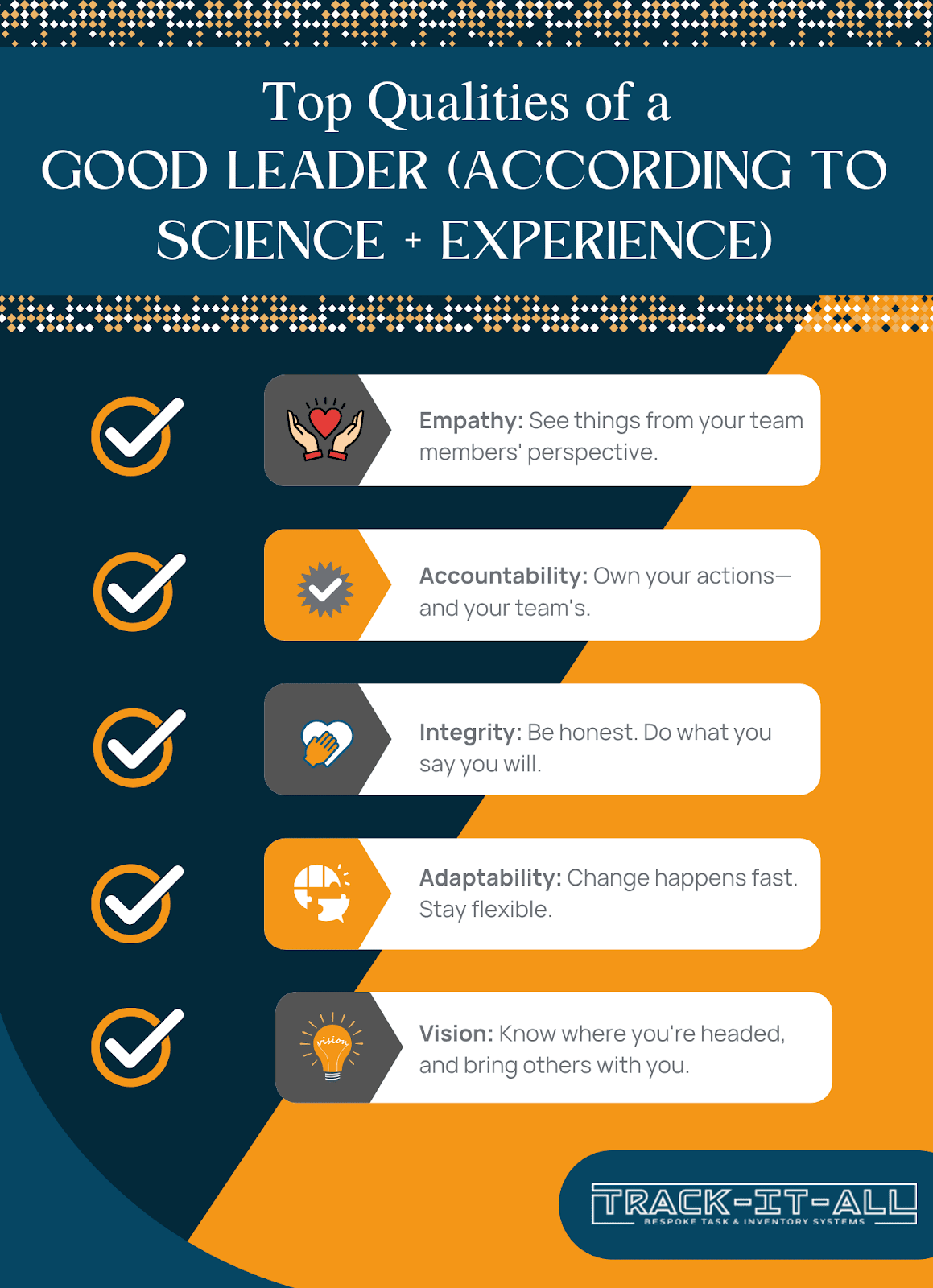So, you’re a new leader. First of all—congrats! Stepping into leadership is a big move, and it’s more than just a promotion. It comes with a mindset shift. You’re not only managing tasks anymore—you now guide people, inspire your team members, and align them with organizational goals.
Here’s what to keep in mind as you get started:
- Define leadership not just as authority but as service and vision.
- Recognize that leadership means supporting others to do their best work.
- Understand the difference: Management skills keep operations smooth, but leadership skills inspire teams to go above and beyond.
And by the way, we’re Track-It-All—a proudly South African software company offering a cloud-based task, inventory, HR, and CRM platform that helps leaders like you effectively manage people and processes—anytime, anywhere.
The Big 5: Essential Management Skills Every Leader Needs
There are some essential skills every leader needs in their toolkit. Here are the Big 5:
- Time Management: Plan and prioritize your day. Tools like management software (hello, Track-It-All!) make this a breeze.
- Effective Delegation: Trust your team members. Assign tasks with clarity, not micromanagement.
- Conflict Management: Learn to manage conflicts before they grow. Don’t avoid hard conversations.
- Goal Setting: Align your goals with business objectives. Make them SMART—specific, measurable, achievable, relevant, time-bound.
- Performance Management: Use data and dialogue to help team members grow.
These management skills are important for every effective leader to master.
10 Key People Management Skills to Master (So You Don’t Micromanage!)
Here are the 10 essential people management skills to help you lead better:
- Active Listening: Don’t just wait your turn to talk—really listen.
- Give feedback that actually helps—not just “good job” or “do better.”
- Inspire with clarity and confidence, not by barking orders.
- Leadership coaching over control: help your people grow.
- Set healthy boundaries around time, communication, and expectations.
- Show up with empathy—know when someone’s having a rough day.
- Know your team’s strengths and skills and capabilities.
- Build interpersonal skills to connect, not just command.
- Stay calm under pressure—stress management is key.
- Let go of perfectionism. Trust your team members to get the job done.
Top Qualities of a Good Leader (According to Science + Experience)

The Power of Emotional Intelligence in Leadership
Emotional intelligence isn’t just a buzzword—it’s what makes effective leaders stand out.
- It helps you manage people with empathy, especially during stress.
- Emotional intelligence builds trust with your team members.
- It improves leadership communication and inspires loyalty.
- High-EQ leaders handle conflict management with grace.
Developing EQ through leadership training programs boosts leadership effectiveness.
Strategic Thinking: The Secret Sauce Behind the Best Leaders
Strategic thinking helps you connect daily tasks to the big picture.
- Think long-term while staying grounded in daily needs.
- Balance priorities like people, time, and business performance.
- Use data from platforms like Track-It-All for effective problem-solving.
- Make space for innovation without losing sight of goals.
This is how strong leadership turns vision into action.
Good Leadership = Great Communication
In the modern workplace, communication is everything.
- Effective communication today includes emails, video calls, chats, and even emojis.
- Use tools to keep everyone aligned (Track-It-All’s team dashboards are great for this).
- Create feedback loops that feel safe, not scary.
- Know when to communicate less and listen more—that’s leadership.
Clear, kind, and consistent communication skills allow leaders to shine.
Organizational Superpowers: How to Build High-Functioning Teams
To build awesome teams within an organization, you need:
- Clear team norms—what’s okay, what’s not.
- Roles that fit each person’s skills and capabilities.
- A positive work environment with psychological safety.
- Tools that simplify collaboration (Track-It-All does that, too).
Organizational change starts with team dynamics.
Professional Development for Leaders Who Want to Stay Ahead
Leadership development isn’t optional. It’s essential.
- Learn continuously. Leadership is a muscle, not a title.
- Enroll in a leadership development program or find a coach.
- Take leadership training that focuses on digital skills, empathy, and resilience.
- Track your growth with a professional development plan.
Leadership and management skills grow with time—but only if you invest in them.
Change Management Made Simple (No MBA Required)
Managing organizational change doesn’t have to be overwhelming.
- Understand the psychology of change: People fear uncertainty, not the change itself.
- Communicate consistently and stay visible.
- Use change-friendly tools (like Track-It-All) to reduce confusion.
- Align changes with organizational vision and values.
Effective change management creates smoother transitions and more confident team members.
Mistakes New Managers Make (and How to Avoid Them Like a Pro)
Here are a few common missteps new managers make:
- Over-promising to impress and under-delivering.
- Forgetting that team members are humans, not robots.
- Trying to do it all alone—instead of learning to effectively delegate.
- Skipping leadership training because you’re “too busy.”
- Ignoring your own growth and leadership development.
Learning from these helps emerging leaders grow faster.
Leadership Skills That Every Leader Needs to Stay Relevant
Leadership in today’s fast-paced world means learning fast and adapting often:
- Digital literacy: Know your way around tools and dashboards.
- Cross-cultural competence: Lead diverse, global teams.
- Innovation mindset: Stay curious and open to new ideas.
- Skills like resilience, agility, and communication keep you in demand.
These are the skills every leader needs now more than ever.
From Boss to Guide: Building a Leadership Style That Works for You
Your leadership style shapes how you lead and how your team members respond.
- Are you transformational, servant, or transactional?
- Great leaders must be flexible, not rigid.
- The management style that fits you best depends on your team, your goals, and your values.
Having a core leadership approach doesn’t mean you can’t adapt. In fact, every leader should.
How to Cultivate an Organizational Culture That People Love
Organizational culture isn’t fluff. It shapes everything.
- Celebrate wins (big or small) to create momentum.
- Create shared values with your team.
- Reward great behavior and effort.
- Lead by example—because every effective leader knows culture starts at the top.
This kind of good leadership leads to loyalty and performance.
A Quick Guide to Managing Up, Down, and Sideways
Leadership isn’t just about your direct reports. It’s 360°.
- Communicate clearly with execs about expectations.
- Be transparent and helpful to your team members.
- Collaborate with peers across departments to align on goals.
This builds influence and leadership acumen across every level of your company.
Frequently Asked Questions (FAQs)
1. What are the most important management skills for effective leadership today?
Management skills for effective leadership include communication, delegation, emotional intelligence, and strategic thinking. These skills are essential for anyone looking to thrive in modern leadership roles.
2. How does effective leadership differ from traditional leadership styles?
Effective leadership today focuses more on empathy, adaptability, and collaboration. While traditional methods were often top-down, modern leadership encourages participation and values individual leadership styles among leaders.
3. Can management training really improve leadership abilities?
Absolutely. Management training helps sharpen leadership abilities, enhances decision-making, and builds confidence—especially for those looking to grow into executive leadership positions.
4. What leadership qualities are considered essential for success?
Some key leadership traits include integrity, accountability, emotional intelligence, and the ability to manage people and priorities. These leadership qualities are also essential for building trust and leading high-performing teams.
5. How can stress management improve your leadership performance?
Stress management is crucial for effective management. Leaders who manage stress well make better decisions, maintain clearer communication, and set a calm example for their team—an often overlooked but powerful leadership tool.
6. What are some skills that can help future leaders succeed?
Skills that can help include resource management, problem-solving, innovation, and cross-functional thinking. Building these skills within your team can also boost overall performance—something taught in nearly every top school of business.

Closing Thoughts: Why the Best Leaders Never Stop Learning
Leadership development is never “done.”
- Reflect on your wins and lessons.
- Seek feedback from peers and your team members.
- Celebrate milestones—because leading well isn’t easy.
And if you’re ready to streamline how you lead, Track-It-All is here to help. Our all-in-one platform makes it easy to track progress, guide teams, and adapt to change.
Let us help you build stronger leadership habits—visit Track-It-All and start simplifying your workday today!







